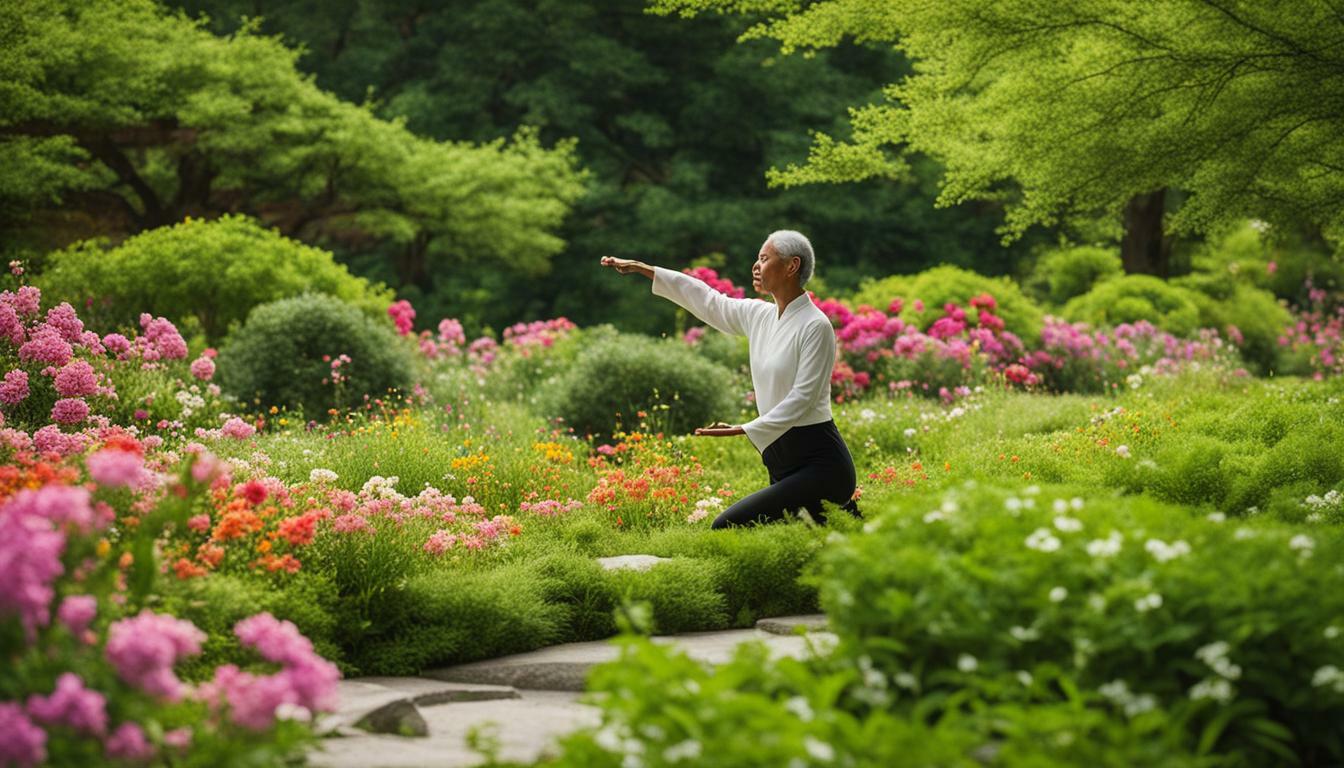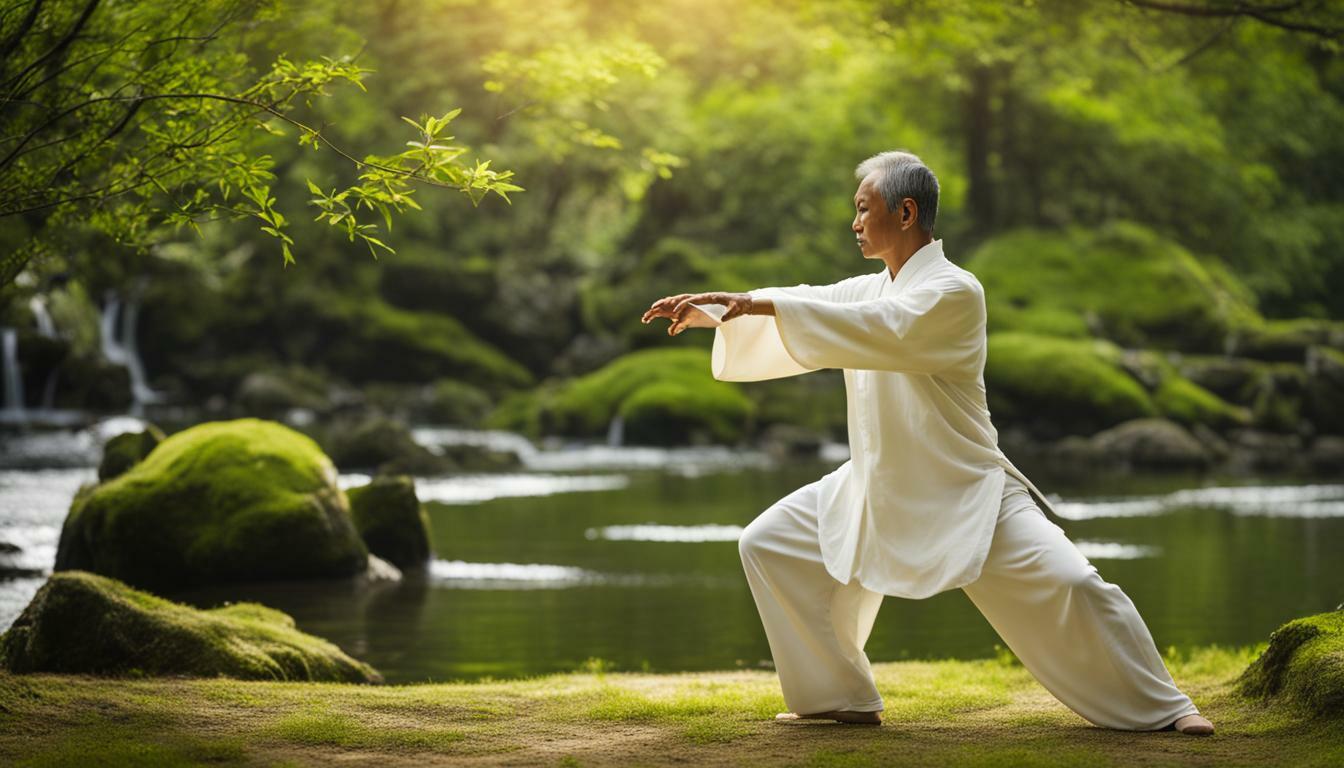Welcome to our journey of discovering the serene power of Tai Chi for Depression. In today’s fast-paced and stressful world, many individuals struggle with maintaining their mental well-being. However, with the practice of Tai Chi, we can find solace and uplift our spirits.
Key Takeaways:
- Tai Chi emphasizes principles like elevating the crown, lifting the spirit, and maintaining correct posture to promote mental and physical well-being.
- It aligns the cervical vertebrae, improves blood flow to the brain, and helps with pain relief and better sleep.
- Tai Chi is beneficial for martial arts practitioners, increasing their awareness and responsiveness.
- It can help alleviate symptoms of arthritis and improve strength, flexibility, and mental health, similar to yoga.
- Tai Chi, along with Qigong and yoga, shares common spiritual foundations, emphasizing the relationship between the body, breath, and a higher power.
The Healing Power of Tai Chi: Improving Mental Health
Explore the healing power of Tai Chi exercises as we uncover their potential in improving mental health, particularly in the context of depression. Tai Chi, a graceful practice that combines gentle movements, deep breathing, and mindfulness, has been found to offer numerous benefits for mental well-being. Let’s delve into the ways Tai Chi can positively impact our mental health.
Physical and Mental Balance
Tai Chi exercises work to restore balance, both physically and mentally. The slow, deliberate movements promote physical stability, coordination, and flexibility, while simultaneously calming the mind. As we flow through the postures, we become more aware of our body, cultivating a stronger mind-body connection that can help alleviate symptoms of depression.
Tai Chi also encourages deep, diaphragmatic breathing, which has been shown to reduce stress and anxiety. The focus on breath allows practitioners to enter a meditative state, quieting the internal chatter and promoting a sense of inner peace. Through the combination of movement and breath, Tai Chi provides a holistic approach to improving mental health.
Furthermore, Tai Chi is often practiced in a group setting, fostering a sense of community and social connection. This social aspect can be particularly beneficial for individuals suffering from depression, as it helps combat feelings of isolation and loneliness.
The Benefits of Mindfulness
Tai Chi is a deeply mindful practice, requiring attention and focus on the present moment. By shifting our awareness to the sensations and movements of our body, we are able to redirect our thoughts away from negative rumination and stressors. This mindfulness practice helps cultivate a more positive mindset and promotes a sense of calm and relaxation.
Studies have shown that regular Tai Chi practice can significantly reduce symptoms of depression, improve mood, and increase overall well-being. It offers a gentle yet effective approach to mental health management, providing individuals with a natural alternative or complementary therapy to traditional treatments.
In conclusion, Tai Chi exercises have tremendous potential in improving mental health, particularly in the context of depression. By promoting physical and mental balance, fostering mindfulness, and providing a sense of community, Tai Chi offers a holistic approach to mental well-being. Incorporating this ancient practice into our daily lives can lead to a greater sense of calm, inner peace, and improved overall mental health.
Finding Balance: Tai Chi Relaxation Techniques for Depression
Discover the art of finding balance through Tai Chi’s relaxation techniques, specially designed to alleviate depression and anxiety. Tai Chi, an ancient Chinese martial art, offers a holistic approach to mental wellness by focusing on gentle movements, deep breathing, and mindfulness. Through its practice, individuals can cultivate a sense of inner calm, improve emotional well-being, and find harmony amidst life’s challenges.
One of the key elements of Tai Chi’s relaxation techniques is the emphasis on slow and deliberate movements. By carefully synchronizing breath and movement, practitioners can enter a state of flow, enhancing focus and releasing tension. As we move through the gentle Tai Chi forms, our bodies become a conduit for energy, allowing us to release negative emotions and cultivate a sense of peace and serenity.
In addition to the physical aspects, Tai Chi also emphasizes mindfulness and awareness of the present moment. Through mindful breathing and meditation, we can develop a deeper connection with our bodies, thoughts, and emotions. With regular practice, Tai Chi can help individuals become more attuned to their mental states, allowing them to recognize and manage depressive symptoms more effectively.
Furthermore, Tai Chi incorporates relaxation techniques that promote deep relaxation and stress reduction. By engaging in slow, flowing movements and gentle stretches, we can release tension from our muscles, ease physical discomfort, and create a sense of physical and mental well-being. These relaxation techniques not only help alleviate depressive symptoms but also contribute to overall health and vitality.
Benefits of Tai Chi Relaxation Techniques for Depression:
- Promotes a sense of inner calm and tranquility
- Reduces stress and anxiety levels
- Enhances mindfulness and self-awareness
- Increases focus and concentration
- Improves overall mental well-being
In conclusion, Tai Chi’s relaxation techniques offer a powerful tool for individuals seeking to alleviate depression and anxiety. By practicing slow, intentional movements, focusing on breath and mindfulness, and embracing relaxation techniques, we can cultivate a sense of balance and inner peace. Incorporating Tai Chi into our daily routine can help us find harmony within ourselves and navigate the challenges of life with greater resilience and well-being.
Cultivating Emotional Well-Being: Tai Chi Meditation for Depression
Immerse yourself in the transformative practice of Tai Chi meditation, as we delve into its potential to cultivate emotional well-being and help manage depressive symptoms. Tai Chi, with its gentle, flowing movements and focused breathwork, offers a serene and powerful way to connect with your inner self and find balance amidst the challenges of depression.
Through the practice of Tai Chi meditation, individuals can experience a sense of calm and mental clarity. By focusing on the present moment and deepening the connection between mind, body, and breath, Tai Chi meditation can help alleviate symptoms of depression, such as anxiety, stress, and negative thoughts.
In Tai Chi meditation, practitioners often adopt a standing or seated posture, grounding themselves and allowing energy to flow freely throughout their body. This practice promotes self-awareness and a deep sense of relaxation, enhancing emotional well-being and providing a respite from the turbulence of depressive symptoms.
Benefits of Tai Chi Meditation for Managing Depressive Symptoms:
- Reduces stress and anxiety levels
- Promotes a sense of calm and relaxation
- Improves focus and mental clarity
- Cultivates self-awareness and mindfulness
- Enhances emotional well-being and uplifts the spirit
“Tai Chi meditation has become an invaluable tool in my journey towards managing depression. The gentle movements and deep breathing help soothe my mind and bring a sense of peace within. It’s like giving myself a daily dose of self-care and self-compassion.”
Incorporating Tai Chi meditation into your routine can be a valuable addition to your overall mental health and well-being. Whether practiced alone or as part of a Tai Chi class, the meditative aspect of Tai Chi empowers individuals to take an active role in managing their depressive symptoms and finding inner harmony.
As we explore the various aspects of Tai Chi and its benefits for mental wellness, we invite you to open your heart and mind to the transformative power of Tai Chi meditation. Together, let’s discover the serenity and balance that await on this path towards emotional well-being.
| Tai Chi Meditation for Depression | Tai Chi for Managing Depressive Symptoms |
|---|---|
| Reduces stress and anxiety levels | Enhances emotional well-being and uplifts the spirit |
| Promotes a sense of calm and relaxation | Improves focus and mental clarity |
| Cultivates self-awareness and mindfulness |
Tai Chi Therapy: Harnessing the Power of Movement and Breath
Experience the transformative power of Tai Chi therapy as we delve into the harmonious relationship between movement, breath, and mental health, specifically in relation to managing depression.
Tai Chi, an ancient Chinese practice, offers a unique therapeutic approach to combat depression. By combining slow and graceful movements with deep breathing techniques, Tai Chi creates a profound mind-body connection that has been shown to alleviate depressive symptoms. The gentle, flowing movements promote physical relaxation while calming the mind, creating a sense of inner peace and balance.
One of the key aspects of Tai Chi therapy is its focus on cultivating mindfulness. As you engage in the deliberate and controlled movements, your attention is directed inward, allowing you to observe and release negative thoughts and emotions. This mindful movement meditation can help break the cycle of rumination and bring a sense of clarity and tranquility to the mind.
In addition to its mental health benefits, Tai Chi therapy also improves physical well-being. The gentle exercises promote flexibility, strength, and balance, which can be especially beneficial for individuals experiencing depression, as physical symptoms often accompany the condition. By integrating movement and breath, Tai Chi therapy supports the body’s natural healing processes, fostering a sense of vitality and overall well-being.
| Tai Chi Therapy Benefits for Depression: |
|---|
| Alleviates depressive symptoms |
| Creates a sense of inner peace and balance |
| Cultivates mindfulness and breaks the cycle of rumination |
| Promotes physical flexibility, strength, and balance |
| Fosters overall well-being |
Experience the transformative power of Tai Chi therapy as we embrace the harmonious relationship between movement, breath, and mental health. Discover a new path towards inner peace and well-being as you unlock the healing potential of Tai Chi. Join us in exploring the serenity and vitality that await as we embark on this journey together.
The Spiritual Foundations: Uniting Mind, Body, and Spirit
Uncover the deep spiritual foundations of Tai Chi as we delve into its profound impact on emotional well-being, harmonizing the mind, body, and spirit. Tai Chi, with its graceful movements and mindfulness, goes beyond physical exercise to nurture the inner self, fostering a sense of connection and tranquility.
Rooted in ancient Chinese philosophy, Tai Chi embraces the principles of yin and yang, the harmonious balance of opposing forces. By cultivating this balance, practitioners find harmony within themselves and in their surroundings. The deliberate, flowing movements of Tai Chi allow for a meditative state, promoting a sense of peace, clarity, and emotional well-being.
Through the practice of Tai Chi, individuals learn to synchronize their breath with movement, creating a profound mind-body connection. This mindful breathing technique calms the mind, relaxes the body, and promotes a sense of present-moment awareness. The harmonization of breath and movement unifies the mind, body, and spirit, fostering a sense of inner peace and emotional stability.
The spiritual journey of Tai Chi extends beyond individual practice. In group settings, practitioners come together to cultivate positive energy and support one another’s growth. The shared experience of Tai Chi creates a sense of community, nurturing a deeper connection not only with oneself but with others as well. This sense of connection with a higher power and with fellow practitioners contributes to the overall emotional well-being and spiritual fulfillment that Tai Chi offers.
FAQ
What are the benefits of practicing Tai Chi?
Practicing Tai Chi has numerous benefits for both mental and physical well-being. It improves blood flow to the brain, aligns the cervical vertebrae, helps with pain relief, and promotes better sleep. It also increases awareness and responsiveness, making it beneficial for martial arts practitioners. Additionally, Tai Chi improves strength, flexibility, and mental health, and can alleviate symptoms of arthritis.
What are the spiritual foundations of Tai Chi?
Tai Chi, along with qigong and yoga, shares common spiritual foundations. These practices focus on the relationship between the body and breath, moving as a connected whole, and involving a higher power. Qigong harmonizes the body’s energy with that of the universe, while Tai Chi embraces the yin and yang elements to find balance. Yoga unites the mind, body, and spirit, emphasizing harmony within and with God.
How can Tai Chi help with depression?
Tai Chi is a gentle and meditative exercise that can help lift spirits and improve mental wellness. Its peaceful and serene nature can be beneficial for individuals struggling with depression. Tai Chi exercises promote mental well-being, relaxation, and balance, providing a sense of calmness that can help manage depressive symptoms. Additionally, the meditative aspect of Tai Chi can cultivate emotional well-being and reduce depressive symptoms.
Can Tai Chi be used as a form of therapy for depression?
Yes, Tai Chi can be used as a form of therapy for individuals experiencing depression. Its therapeutic aspects, such as movement and breath work, contribute to overall well-being. Tai Chi therapy combines physical exercise, relaxation techniques, and meditation to promote emotional well-being. By harnessing the power of movement and breath, Tai Chi can help individuals manage depressive symptoms and cultivate a healthier mind-body connection.
Is Tai Chi suitable for beginners?
Yes, Tai Chi is suitable for beginners. It is a gentle and low-impact exercise that can be practiced by people of all ages and fitness levels. Tai Chi classes often cater to beginners, providing step-by-step instructions and guidance to ensure proper form and technique. It is a welcoming and inclusive practice that allows individuals to progress at their own pace.
Can Tai Chi be practiced alongside other forms of exercise?
Yes, Tai Chi can be practiced alongside other forms of exercise. It complements other exercises by promoting balance, flexibility, and mental clarity. Incorporating Tai Chi into a fitness routine can enhance overall physical and mental well-being. It can be a valuable addition to activities such as yoga, qigong, martial arts, and cardiovascular exercises.




